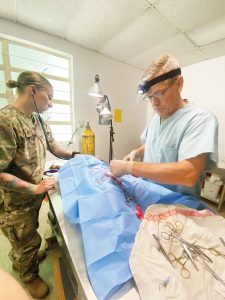Army IRT services over 300 pets so far

Lt. Col. Eugene Johnson, right, a veterinarian with the U.S. Army Medical Detachment Veterinary Services Support, is assisted by Sgt. Katherine Thompson during a spaying procedure yesterday at the Saipan Cares for Animals clinic on Middle Road in Gualo Rai. (LEIGH GASES)
U.S. Army veterinarians who are doing an outreach at the Saipan Cares for Animals clinic in Gualo Rai have so far spayed and neutered over 200 pet cats and dogs and administered over 137 vaccines to dogs and 11 vaccines to cats, along with 42 rabies vaccines since the start of their free services last June 18.
As a show of appreciation, the team from the U.S. Army’s 445th Medical Detachment Veterinary Services Support had a “Distinguished Visitor Day” yesterday, during which they were introduced to several ranking officials at the Office of the Governor and had a chance to explain what their outreach, called Innovative Readiness Training program or IRT, is all about. The program basically allows service members to work with local communities in need of assistance while military personnel deployed for the mission get hands-on, real world training.
Afterwards, the people in attendance were invited to observe their work being done at the Saipan Cares for Animals clinic and at the Gualo Rai Youth Center.
The group consists of a mix of medical experts and trainees. The veterinary medical personnel include five veterinary corps officers and 10 animal care specialists. There is one senior veterinary noncommissioned officer and one supply specialist. The veterinary mission offers free neutering and spaying services up until tomorrow only. The services are on a first come, first served basis only.
Master Sgt. Jennifer Bunch, who is the noncommissioned officer in charge of the mission, said that by the time they get to the clinic at 6am, community members are already lined up outside the clinic—even as early as 3am.
“I’ve had anywhere from 20 people to about 50 lined up in the morning. …I have to be the bearer of bad news. I can only do so many dogs, so many cats, spays, neuters, depending on what it is. We’ll determine how long it takes any of my vets at a given time to do the operation. I got to make sure that I have enough on my staff there to do the pre-exam to make sure that they’re healthy enough, because we’ve unfortunately had to turn away a few animals because they were not healthy enough to go under anesthesia.
“So those are the things we have to look for. And then they go in, they get their medications, they go to sleep, they have a nice nap, they get surgery, then our animal care specialist…monitors them. Most of them are cuddled for 30 minutes to an hour while they wake up. Then after that [they]… go home to recover for seven to 10 days and we recommend them to be couch potatoes and so forth,” she added.
Veterinarian Lt. Col. Eugene Johnson thinks he may have spayed and neutered “more dogs, but I don’t know exactly. We’ve probably done over 200 since we started last week, total. And we just got to mix them in. The cats generally go quicker than the dogs, depending on the size of the dog and the age of the dog…”
SCA receptionist Tiara Pelisamen said that the feedback that they have gotten from community members is a lot of gratitude. She said the wait is long, with the lines in the morning going past the neighboring poker arcade next to the clinic, but people wait it out because they want their pets spayed and neutered.
- Senate President Jude Hofschneider (R-Tinian), ninth from right, who is currently the acting governor, is joined by lawmakers, special assistant Glenna Sakisat Palacios of the Commonwealth Bureau of Military Affairs, some members of the U.S. Army Medical Detachment Veterinary Services Support team, Youth Affairs Office staff, and Commonwealth Office of Transit Authority staff, after a presentation yesterday in the Office of the Governor’s conference room. (LEIGH GASES)
- Acting governor Jude Hofschneider, center, is seen with the military detachment under the Innovative Readiness Training program at the Gualo Rai Youth Center where animal vaccines are being administered for free. (CONTRIBUTED PHOTO)

























